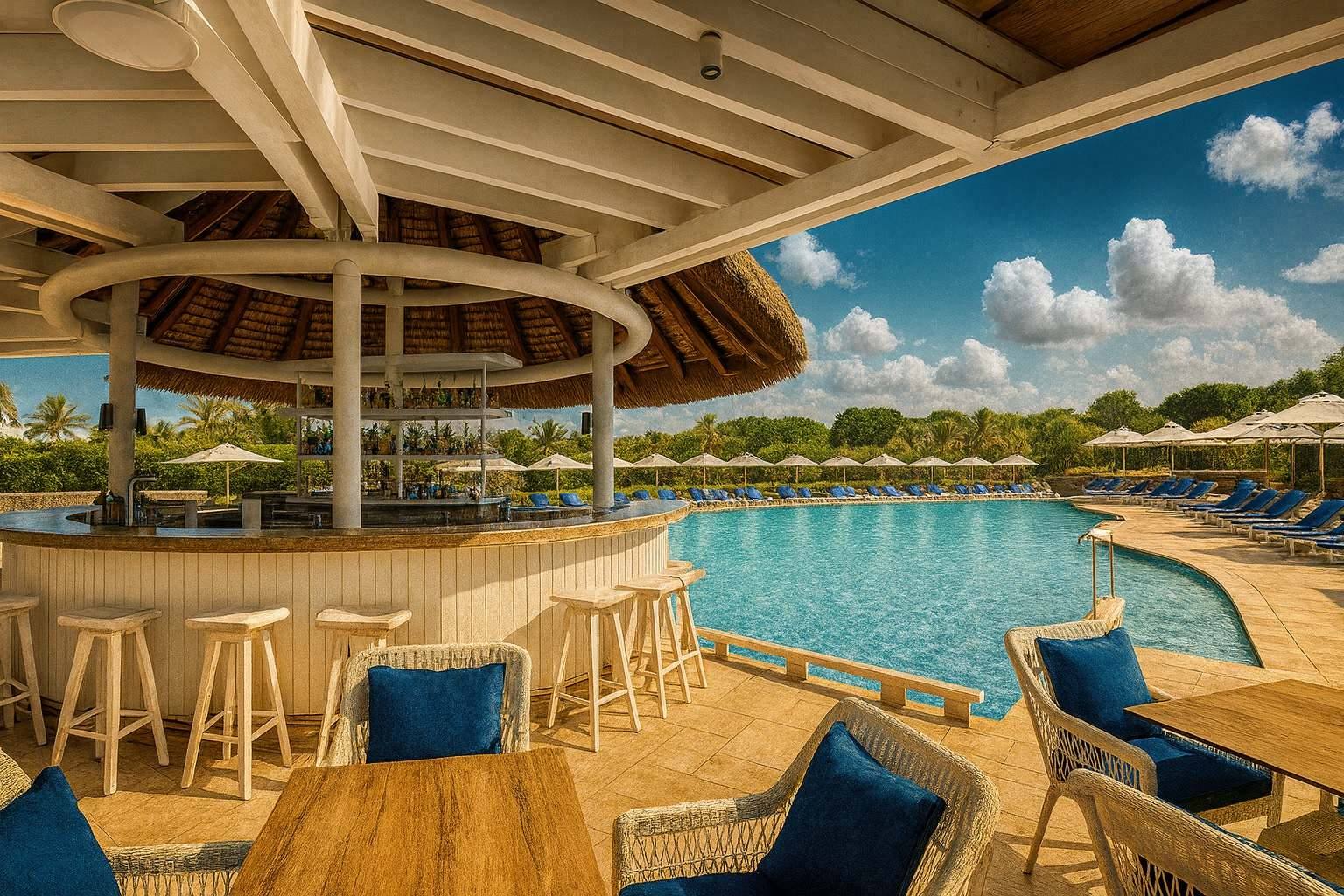A luxury riverside home in Warsash, Hampshire, has sparked a planning row after neighbours warned a proposed pool house with bar and sauna could turn the property into a “party house”. Here’s what is planned, what locals say, and how UK rules on garden pools and outbuildings apply.
A luxury riverside home on the banks of the River Hamble has become the latest flashpoint in Britain’s long-running battles over backyard building, after plans for a pool house with a bar and sauna triggered complaints from neighbours who fear the property could turn into a full‑blown “party venue”.1
The proposal – already approved by Fareham Borough Council – has now drawn national attention, with the case highlighting growing tensions between homeowners investing in high‑end leisure facilities and neighbours worried about noise, privacy and late‑night entertaining.1
Key points
- Location: Ferry Lane House, Brook Avenue, Warsash, near Southampton – a large riverside home backing onto the River Hamble.2
- Project: New outdoor swimming pool plus an enclosed pool house featuring a bar with stools, a sauna and built‑in TV.1
- Neighbours’ concerns: Six local residents submitted objections, warning the complex could turn the home into a “party house” and disturb the quiet, upmarket neighbourhood.1
- Council decision: Fareham Borough Council approved the application (ref P/24/1437/FP) in November 2024.2
- Wider context: Similar rows over private pools and garden leisure buildings are emerging across the UK as more owners seek resort‑style amenities at home.3
The luxury home at the centre of the row
The dispute centres on Ferry Lane House on Brook Avenue in Warsash, an exclusive residential road overlooking the River Hamble in Hampshire. According to estate‑agent particulars, the property is a substantial gated residence with more than 7,500 sq ft of accommodation, set in around 1.5 acres of private grounds that run down to the river.4
The house, which includes multiple reception rooms, an annexe above a triple garage and landscaped gardens, has been marketed in recent years as a high‑end “executive home” – the sort of place where a private pool and garden spa would not look out of place.4
Planning documents from Fareham Borough Council list Mr Peter Leech as the applicant for proposals described as the “Construction of a swimming pool and associated pool house in the rear garden behind the main house” at Ferry Lane House. The application, lodged in October 2024, was approved the following month.2
What exactly is being built?
While the council’s planning portal gives only a short description of the works, national reporting on the case sheds more light on the design. The new structure will sit in the garden close to the main house and is described as a sizeable pool house serving a new outdoor swimming pool.2
According to coverage in the Telegraph, the outbuilding is expected to include:1
- an enclosed seating area facing the pool
- a bar with stools
- a sauna
- and a built‑in television, turning the space into a self‑contained entertainment hub rather than a simple changing room.
From a planning perspective, this moves the scheme beyond a basic pool into something closer to a compact leisure pavilion – the kind of setup more commonly associated with boutique hotels or private members’ clubs than suburban streets.
Neighbours’ fears: ‘We don’t want a party house’
The controversy arises not from the idea of a swimming pool itself, but from what worried neighbours say the complex could be used for.
Reports state that six households filed online objections with Fareham Borough Council, expressing concerns that the bar‑equipped pool house could effectively turn the garden into a permanent party zone, with late‑night music, visitors and cars disturbing the area’s otherwise quiet character.1
Objections, as summarised in media coverage and typical UK planning disputes, are understood to focus on:
- potential noise and disturbance, especially in summer evenings
- worries about overlooking and loss of privacy from people congregating around the pool
- fears that the development would fundamentally change the residential character of the street if used for regular social events
Interestingly, while multiple residents submitted comments via the council’s online system, none of them are reported to have attended the relevant planning committee session in person when the application was considered – something councillors across the country often note can weaken the impact of objections.1
The homeowners behind the project have not publicly commented in detail, but the application was presented to the council as a private facility for family use within the grounds of their own home, not as a commercial party venue.2
Why did Fareham Borough Council approve the pool house?
Despite the objections, Fareham Borough Council’s case tracker shows application P/24/1437/FP as APPROVED, with the decision recorded on 29 November 2024.2
Although the full committee report is not publicly accessible in all detail, a few key planning considerations can be inferred:
- Residential use
- The pool and pool house are classed as incidental to the enjoyment of the dwelling – essentially an extension of the owners’ private living space rather than a separate business use. That makes them broadly in keeping with the residential character of the area.5
- Permitted development vs planning control
- In England, many garden outbuildings and domestic outdoor swimming pools can be built under “permitted development” rights, meaning no formal application is needed if strict size and position limits are met.6
- However, larger structures, those near boundaries or highways, or those including leisure facilities like bars and saunas often do require a full planning application – as in this case.7
- Impact on neighbours
- Councillors generally have to balance neighbours’ fears about potential use (for example, parties) against what can actually be controlled through planning law. A private pool house used by the residents is usually acceptable; persistent anti‑social behaviour, if it occurs, would be dealt with later under noise or nuisance regulations rather than by refusing permission in advance.
- Design and scale
- Official guidance emphasises that outbuildings should not dominate a garden or harm neighbours’ outlook.8
- Media reporting also suggests that, while some objectors felt the structure would dominate nearby gardens, planning officers advised councillors that the design and siting were acceptable in planning terms.9
With those factors in mind, councillors voted to approve the scheme, effectively concluding that the benefits to the homeowner and the building’s design outweighed the speculative risk of future parties getting out of hand.
Do you need planning permission for a garden pool and bar in the UK?
Many readers looking at the Warsash row will be wondering what would happen if they tried to install a similar setup at home. The answer: it depends how big and elaborate your plans are.
According to official guidance on the Planning Portal, most domestic outdoor pools and many garden outbuildings fall under “permitted development” rights – meaning no planning application is needed – provided all conditions are met. Key limits include:6
- Outbuildings must generally be single storey and below specific height limits.
- Together with other extensions and sheds, they must not cover more than 50% of the garden.
- Structures often cannot sit forward of the principal elevation (i.e. in front of the house in most cases).
- Additional restrictions apply in conservation areas and around listed buildings.
Specialist pool companies and planning consultants broadly agree that a simple outdoor pool dug into the ground, without a large building around it, seldom needs formal permission, as long as it stays within those rules.10
However, once you start adding:
- a substantial pool house,
- a bar or kitchen,
- a sauna, gym or guest accommodation,
you’re far more likely to need full planning consent – exactly what the Warsash owners sought and obtained.7
For homeowners considering similar projects, planners and pool specialists strongly advise checking local policies early and speaking with neighbours before submitting drawings, especially in tightly packed or high‑value areas where objections are likely.11
A wider trend: resort‑style back gardens vs neighbourhood peace
The Warsash case is part of a broader trend across the UK, as more affluent homeowners look to turn their gardens into mini‑resorts – a shift accelerated by the pandemic stay‑at‑home years and the rising cost of foreign travel.
Recent examples include:
- Andrew Castle’s Surrey mansion plans – The former tennis player and TV presenter recently won approval for a new £5m home with outdoor pool, pool house and sauna despite neighbours branding the project “inappropriate” and hiring a planning consultant to fight it. The council approved the scheme with conditions on privacy and roof‑terrace use.12
- Actor Ashley Walters’ Kent pool complex – The TV star behind the Netflix series Adolescence secured permission for a detached outbuilding containing a swimming pool, gym and games room at his home, again over local concerns about scale and impact. Planners ruled the building, more than 50 metres from nearby homes, would not harm neighbours’ amenity.13
Planning consultants say these high‑profile cases reflect a more everyday pattern: many councils are seeing more applications for pool houses, bars, outdoor kitchens and large garden rooms, often in quiet residential streets where even the prospect of extra noise triggers strong feelings among neighbours.14
What happens next in Warsash?
For now, the planning decision at Ferry Lane House stands. The approved plans mean the owners are free to build the pool and pool house, subject to any conditions imposed by the council and standard building regulations.2
If, once completed, the complex were used in a way that caused persistent late‑night noise or anti‑social behaviour, neighbours could still:
- log complaints with Fareham Borough Council’s environmental health or noise teams
- call the police if gatherings became disorderly
- potentially ask the council to consider whether the use of the outbuilding had changed from incidental domestic use to something more akin to a commercial or quasi‑commercial venue
But those steps would depend on actual behaviour, not predicted fears.
In the meantime, the Warsash case serves as a textbook example for anyone eyeing a glamorous garden upgrade: even if your plans meet the rules and win permission, talking early and openly with neighbours may be the best way to stop your dream pool from becoming tomorrow’s headline.






